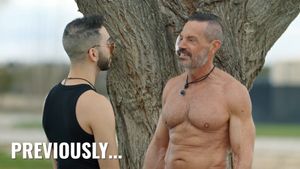
Treatment GuideJust DiagnosedSex & DatingAfrican AmericanStigmaAsk the HIV DocPrEP En EspañolNewsVoicesPrint IssueVideoOut 100
CONTACTCAREER OPPORTUNITIESADVERTISE WITH USPRIVACY POLICYPRIVACY PREFERENCESTERMS OF USELEGAL NOTICE
© 2025 Pride Publishing Inc.
All Rights reserved
All Rights reserved
By continuing to use our site, you agree to our Private Policy and Terms of Use.
It is hard for one's heart not to go out to babies infected with HIV or to cherub-faced HIV-positive schoolchildren who do not understand why parents of some of their classmates will not let them play together. But how hard does an HIV-positive 16-year-old who was infected through unprotected sex tug at your heartstrings? Or a 17-year-old who has been living with the virus since birth? Or a homeless teenager who seroconverted while surviving on the streets and using injection drugs? While infected young adults are every bit as deserving of the sympathy given to HIV-positive infants, the reality is that many adults are ambivalent about HIV-positive teenagers, says Gary Remafedi, MD, director of the Youth and AIDS Projects at the University of Minnesota in Minneapolis. 'Children are often described as the epidemic's youngest victims,' he says, 'but adolescents are frequently thought of as AIDS's youngest perpetrators.' Because of this, there is far less emphasis on getting teenagers the treatment and other services they need. This gap in HIV care is precisely what led Mildred Jamison, founder and CEO of St. Louis's Faith Village, to establish Dream House, a residence for HIV-positive homeless teenagers in the city. 'No one at all was taking care of the needs of these teenagers,' she says. 'There were programs serving babies'and others serving adults'but nothing for the teenagers. And we determined that there were at least 65 homeless kids with HIV in the city who needed our help.' Dream House opened in May 2002 and today is home to up to eight HIV-positive teenagers who receive not only housing but also medical, social, and psychological support services. In Los Angeles, Caring for Children and Families With AIDS was founded in 1990 as a service for HIV-positive infants called Caring for Babies With AIDS, but it has evolved to include older youths and now operates two group homes for HIV-positive youngsters ranging in age from newborns to teenagers. Residents are typically in the foster care system, having been abused or neglected by parents or guardians, says executive director Jackie Gelfand. Some are AIDS orphans or were abandoned as infants. Meeting a Variety of Needs Housing is only one of myriad special services'which include nutritional education, counseling, substance abuse treatment, and advice on sex, dating, and interacting with their HIV-negative peers'that HIV-positive teens need but often do not receive because they are wrongly evaluated as either children or adults. Even medication issues for HIV-positive teens are unique, Remafedi says. Although adolescents are generally given the same regimens as adults, there is little clinical data to show that this approach works, particularly given that teens experience extreme fluctuations in growth and sex hormone levels during puberty. 'We know nothing about pharmacokinetics in adolescents,' he claims. And even if the anti-HIV drugs do work, it is an enormous challenge to get teenagers to take their pills as prescribed. Adolescents and young adults have perhaps the most difficulty of all HIV-positive people with adherence, says Michael Cooley, member services coordinator for San Francisco's Bay Area Young Positives, a peer-based youth support and services agency. Many teens simply become preoccupied with other aspects of their lives'school, work, spending time with friends'and let their attention to their health slip. There is also a sense of invincibility wrongly embraced by many teenagers'what Cooley calls the 'superman syndrome''that leads them to believe nothing bad will happen to them if they do not take their medication. At Dream House and CCFA, employees are on hand to dispense anti-HIV drugs and make sure they are taken as prescribed. But staff members worry how well the youths will stick to their regimens after they turn 18, exit the foster care system, and face the intricacies of HIV treatment on their own for the first time. Because of this, Remafedi says, it may be wiser to postpone antiretroviral therapy for some adolescents. Treating the physical aspects of HIV disease is only half the battle, though. Psychological issues also have an enormous effect on HIV-positive teenagers who are already struggling with the growing pains of adolescence. 'They tend to be more depressed than the average teenagers,' Gelfand says of HIV-positive youths. 'These kids also tend to act out on their depression. Sometimes it shows up as rage.' Irie Session, adolescent services coordinator for Bryan's House in Dallas, an agency providing medical care, temporary housing, and support services for children infected and affected by HIV disease, adds that HIV-positive adolescents also tend to struggle with substance abuse and issues of self-esteem, self-awareness, and sexuality. Facing Up to Fears While already dizzyingly complex, the emotional and psychological issues of HIV-positive teenagers can vary dramatically between those who were infected as infants and have lived their entire life with HIV and those who were infected as teenagers through sexual activity or drug use. 'A number of teens when initially diagnosed will go through a period of shock,' explains David LaKine, director of Dream House. 'Most are pretty much in denial, and it takes a lot of work to get them to a point where there's a realization that they have the virus. Some will show signs of posttraumatic stress. Others will have deep depression.' To address this wide range of emotional and psychological needs, Bryan's House, Dream House, and CCFA all offer individual therapy and other counseling services to their clients. Psychiatric medications are also prescribed when needed. To combat drug and alcohol abuse, which affects about 70% of Bay Area Young Positives clients, the agency has hired a substance abuse specialist and launched a harm-reduction group. CCFA is just now creating substance abuse policies and programs. 'This is new territory for us,' says CCFA board chairwoman Linda Daly Yablans. 'We're literally writing the book as we speak.' One lesson that Yablans and other specialists are beginning to learn is that many strategies that work with adults fail when applied to teenagers. Case in point: support groups. Cooley, Session, and Remafedi all say their organizations have had difficulty in getting teenagers to embrace structured support circles. 'We tried on many occasions to bring young people together in support groups, and that approach never worked out,' Remafedi notes. 'They didn't want to share that information with each other in that setting. They're very private, and oftentimes there's a great deal of shame involved.' To get around that reluctance to talk openly about HIV issues, Session says, 'you have to be creative and couch it into another type of activity. You're still getting the same information to the teens and finding out what their needs and issues are, but you're not using the traditional support group counseling situation.' Bryan's House, like Dream House, steers away from structured support groups and instead creates opportunities for HIV-positive youths to socialize at such events as bowling trips, movie nights, and visits to museums and theme parks. These gatherings give young adults opportunities to open up and talk with each other when they feel comfortable doing so. The Struggle to Fit In Yet even when given safe spaces, many HIV-positive youths never broach HIV issues. Remafedi says this aversion is due to the likelihood that teenagers struggle more with the stigma and discrimination rooted in HIV than do other demographic groups. 'The last thing a teenage kid wants is to be different from everyone else,' says Joe Cristina, founder of the fund-raising organization Children Affected by AIDS Foundation. Because of this, many youths will go to great lengths to conceal that they are HIV-positive. But too much secrecy can unintendedly be a double-edged sword. While keeping HIV-positive youths out of the spotlight may help ease their anxieties and fears, it also prevents the American public'and even many AIDS activists'from recognizing the impact the epidemic is having among adolescents and young adults, which often causes their unique needs to remain unmet. 'Young people don't advocate for themselves,' Remafedi says. 'They don't vote. They don't show up at the table at Ryan White planning meetings. They don't have a voice.' Worse yet, Gelfand says, many HIV-positive youths do not want that voice. 'They don't want to get up there and speak out about this kind of thing,' she explains. 'They're more concerned about whether they can get that pair of Nikes that costs $150, or whether that girl from school will call them. So the only people who can advocate for them are us, and this is all new ground for so many of us.'
From our Sponsors
Most Popular
Why activist Raif Derrazi thinks his HIV diagnosis is a gift
September 17 2024 12:00 PM
How fitness coach Tyriek Taylor reclaims his power from HIV with self-commitment
September 19 2024 12:00 PM
Out100 Honoree Tony Valenzuela thanks queer and trans communities for support in his HIV journey
September 18 2024 12:00 PM
The freedom of disclosure: David Anzuelo's journey through HIV, art, and advocacy
August 02 2024 12:21 PM
Creator and host Karl Schmid fights HIV stigma with knowledge
September 12 2024 12:03 PM
From ‘The Real World’ to real life: How Danny Roberts thrives with HIV
July 31 2024 5:23 PM
Eureka is taking a break from competing on 'Drag Race' following 'CVTW' elimination
August 20 2024 12:21 PM
California confirms first case of even more deadly mpox strain
November 18 2024 3:02 PM
Plus: Featured Video
Latest Stories
A camp for HIV-positive kids is for sale. Here's why its founder is celebrating
January 02 2025 12:21 PM
This long-term HIV survivor says testosterone therapy helped save his life.
December 16 2024 8:00 PM
'RuPaul's Drag Race' star Trinity K Bonet quietly comes out trans
December 15 2024 6:27 PM
Ricky Martin delivers showstopping performance for 2024 World AIDS Day
December 05 2024 12:08 PM
AIDS Memorial Quilt displayed at White House for the first time
December 02 2024 1:21 PM
Decades of progress, uniting to fight HIV/AIDS
December 01 2024 12:30 PM
Hollywood must do better on HIV representation
December 01 2024 9:00 AM
Climate change is disrupting access to HIV treatment
November 25 2024 11:05 AM
Post-election blues? Some advice from mental health experts
November 08 2024 12:36 PM
Check out our 2024 year-end issue!
October 28 2024 2:08 PM
Meet our Health Hero of the Year, Armonté Butler
October 21 2024 12:53 PM
AIDS/LifeCycle is ending after more than 30 years
October 17 2024 12:40 PM
Twice-yearly injectable lenacapavir, an HIV-prevention drug, reduces risk by 96%
October 15 2024 5:03 PM
Kentucky bans conversion therapy for youth as Gov. Andy Beshear signs 'monumental' order
September 18 2024 11:13 AM
Study finds use of puberty blockers safe and reversible, countering anti-trans accusations
September 11 2024 1:11 PM
Latinx health tips / Consejos de salud para latinos (in English & en espanol)
September 10 2024 4:29 PM
The Trevor Project receives $5M grant to support LGBTQ+ youth mental health in rural Midwest (exclusive)
September 03 2024 9:30 AM
Introducing 'Health PLUS Wellness': The Latinx Issue!
August 30 2024 3:06 PM
La ciencia detrás de U=U ha estado liberando a las personas con VIH durante años
August 23 2024 2:48 PM















































































